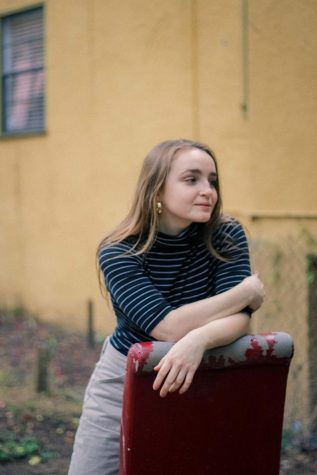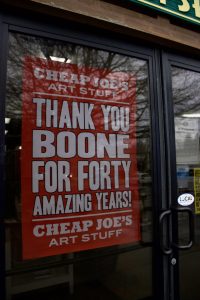Creative project pushes for more disability resources at App State
October 12, 2019
As an undergraduate student, Rebecca Long met with university officials to propose establishing a disability cultural center on campus. From those meetings, Long said they recall lacking evidence of community interest in their proposal. But, the rejection of their initial community-building idea wasn’t an end — it became the inspiration behind Long’s new project, Able-achian.
Able-achian is a creative project raising awareness around “the barriers to full participation experienced on the App State campus by disabled people, as well as by people who don’t identify as disabled but use university support systems.”
Long, who has autism and is now a graduate student and president of the Autistic Students and Allies of the High Country, collaborated with Albert Stabler, an assistant professor of art education, for the project. After drafting a survey with Long at his kitchen table, Stabler, who is severely nearsighted, spoke with the Office of Disability Resources director Maranda Maxey on how they could improve the form. Maxey offered recommendations for more inclusive language and agreed to help spread information about the project. Flyers went up in early September that included a link to the survey.
“I realized that we needed some sort of documentation in place,” Long said. “I was drafting a grand proposal for the disability center; it would be nice to have stories to share that aren’t just my own.”
The form provides space for people to share their experiences receiving or administering accommodations, navigating campus and adjusting to university life, Long said.
Accommodations are changes in educative methods to ensure all students have equal access to learning.
Adriana Laws, administrative assistant for the Office of Disability Resources, said accommodations in higher education under the Americans with Disabilities Act differ from K-12 accommodations under the Individuals with Disabilities Education Act. Laws said higher education accommodations are implemented to ensure equal access, while primary and secondary school accommodations focus on providing services and equipment to ensure success.
ODR provides 15 accommodation options, including testing accommodations, assistive technology and reasonable attendance adjustments.
According to the ODR website, to receive an accommodation, a student must submit “disability documentation or presentation of the functional limitations of a condition which impacts a student’s ability.”
After this step, students are required to negotiate their accommodations with each of their professors.
Stabler and Long said requests for accommodations are often declined, especially when related to attendance. Long said they’ve had professors disrespect their approved testing accommodations in the past.
“I’ve (gotten) to the point where I realized that accommodations only work as well as the people who are in power to enforce those accommodations,” Long said.
Stabler and Long said these concerns were frequently noted in the 28 survey responses they’ve received so far as well as concerns over understaffing at the Counseling Center and ODR.
Stabler, who teaches the course Differentiation and Inclusion in the Art Classroom, said he has heard similar accounts from students who have disabilities. Stabler said his severe nearsightedness has been unaccommodated at faculty workshops and meetings before.
Beyond questions asking participants to record their experiences, the survey asks, “What actions would you like to see App State take to increase the quality and availability of support systems?”
Long and Stabler said they intend to use the survey answers to create artistic responses, such as a zine publication, poster campaigns and performance art. They said they hope the next stage of the project will involve survey takers directly, creating a collective for students, faculty and staff who have disabilities.
Their first planning meeting for the project’s continuation is set for Oct. 21 at 7 p.m. in Wey Hall, Room 202. All survey respondents will be emailed individually with updates.
“It was a way to start doing the groundwork to think about the ways in which we could bring disabled students together,” Long said. “I would love to see some sort of community created that could extend past my time on this campus.”













Ruth Ann Marotta • Oct 15, 2019 at 8:08 am
Oops! In the English Dept., not on the English Dept!
Ruth Ann Marotta • Oct 15, 2019 at 8:07 am
I teach on the English Dept and many students have told me how understaffed the Counseling Center is. They have to wait such a long time to receive counseling.